Abbey challenged the culture of wilderness exploitation by oil, mining, and tourism interests. “Desert Solitaire” asked if any natural treasures could be saved. Here he is featured in the documentary “A Voice in the Wilderness,” as well as in his own words.
httpvh://youtu.be/jOgEs1OZkXg
Desert Solitaire: The Overwhelming Beauty
When Desert Solitaire was first published in 1968, it became the focus of a sarcastic, polemical cult of wilderness preservation and protection. Edward Abbey (1927-1989) would later write The Monkey Wrench Gang, a comic novel advocating sabotage to protest environmentally damaging development, in particular the Glen Canyon Dam on the Colorado River. According to Robert Macfarlane in The Guardian UK:
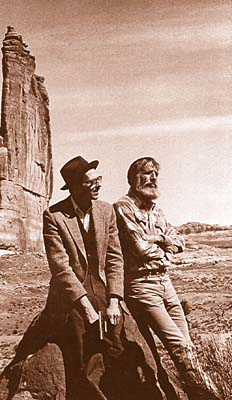

The Monkey Wrench Gang is the wish-fulfillment dream of eco-Luddites everywhere. Civilization violates the land, so Hayduke (“a good, healthy psychopath”) and his pals violate civilization. Crucially, people go unharmed in Abbey’s novel. Machinery is smashed and split, exploded and eviscerated; but drivers and technicians escape. The only vital fluids that get spilled are oil, coolant and petrol. In this way, activism remains ethically distinct from terrorism. The beef of the Monkey Wrench Gang is not with the personnel of the “megalomaniacal megamachine”, but with its material and ideological manifestations. The battle they fight is against developments and double-lane highways, and against the economic principle of maximized shareholder profit and the economic delusion of unlimited growth.
“Growth for the sake of growth is the ideology of the cancer cell.” — Edward Abbey, The Journey Home: Some Words in Defense of the American West
Abbey’s earlier piece, Desert Solitaire, captures the essence of his life during three seasons as a fire watcher and park ranger in southeastern Utah. His quest was to experience nature in simple terms — the silence, the struggle, the overwhelming beauty. But this is also the anguish of a man challenging the growing exploitation of the wilderness by oil and mining interests, as well as by the tourist industry. Understood amid today’s accelerated environmental depredations, Desert Solitaire asks if any of our natural treasures can be saved before the bulldozers strike again.
“Wilderness is not a luxury but a necessity of the human spirit, and as vital to our lives as water and good bread. A civilization which destroys what little remains of the wild, the spare, the original, is cutting itself off from its origins and betraying the principle of civilization itself.” –Edward Abbey, Desert Solitaire

Watch this video on YouTube
Man is a Dream, The Earth Remains
“A man could be a lover and defender of the wilderness without ever in his lifetime leaving the boundaries of asphalt, powerlines, and right-angled surfaces. We need wilderness whether or not we ever set foot in it. We need a refuge even though we may never need to set foot in it. We need the possibility of escape as surely as we need hope; without it the life of the cities would drive all men into crime or drugs or psychoanalysis.” — Edward Abbey, Desert Solitaire
“Men come and go, cities rise and fall, whole civilizations appear and disappear-the earth remains, slightly modified. The earth remains, and the heartbreaking beauty where there are no hearts to break….I sometimes choose to think, no doubt perversely, that man is a dream, thought an illusion, and only rock is real. Rock and sun.” — Edward Abbey, Desert Solitaire: A Season in the Wilderness
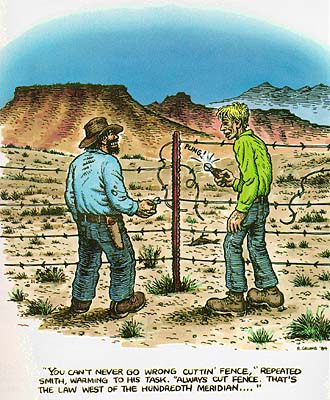

Robert Macfarlane: One thinks of John Muir’s essays, which determined the national-parks policy of Theodore Roosevelt, and inspired to the founding of the Sierra Club; of Rachel Carson’s “Silent Spring” (1962), which caused the banning of DDT in the US and arguably stimulated the creation in 1970 of the EPA (the US Environmental Protection Agency); of Aldo Leopold’s account in “A Sand County Almanac” (1949) of “the land ethic” and its impact on conservation practice; of Bill McKibben’s visionary “The End of Nature” (1989), the first book on climate change written for a general audience; and of the vast and as yet unmapped influence of Cormac McCarthy’s “The Road” (2006). The same year that “The Monkey Wrench Gang” was published, Gary Snyder’s Pulitzer-Prize winning “Turtle Island” appeared, containing his commanding essay “Four Changes”. Snyder dealt with the problems of Population, Pollution, and Consumption, before proposing a means of Transformation. “We have it within our deepest powers,” he concluded hopefully, “not only to change ourselves but to change our culture.” The essay is being reissued this autumn as a stand-alone pamphlet by Artesian Press, in advance of the Copenhagen Climate Change Conference in December.
On the Crooked Trail
“The personification of the natural is exactly the tendency I wish to suppress in myself, to eliminate for good. I am here not only to escape for a while the clamor and filth and confusion of the cultural apparatus but also to confront, immediately and directly if it’s possible, the bare bones of existence, elemental and fundamental, the bedrock which sustains us.” — Edward Abbey
httpvh://youtu.be/_LvfSoDdWLc
Benedicto: “May your trails be crooked, winding, lonesome, dangerous, leading to the most amazing view. May your mountains rise into and above the clouds. May your rivers flow without end, meandering through pastoral valleys tinkling with bells, past temples and castles and poets’ towers into a dark primeval forest where tigers belch and monkeys howl, through miasmal and mysterious swamps and down into a desert of red rock, blue mesas, domes and pinnacles and grottos of endless stone, and down again into a deep vast ancient unknown chasm where bars of sunlight blaze on profiled cliffs, where deer walk across the white sand beaches, where storms come and go as lightning clangs upon the high crags, where something strange and more beautiful and more full of wonder than your deepest dreams waits for you — beyond that next turning of the canyon walls.”
— Edward Abbey
Artwork and photo from Dream Garden Press
For the full Voice in the Wilderness documentary, click here.
Updated: January 29, 2016

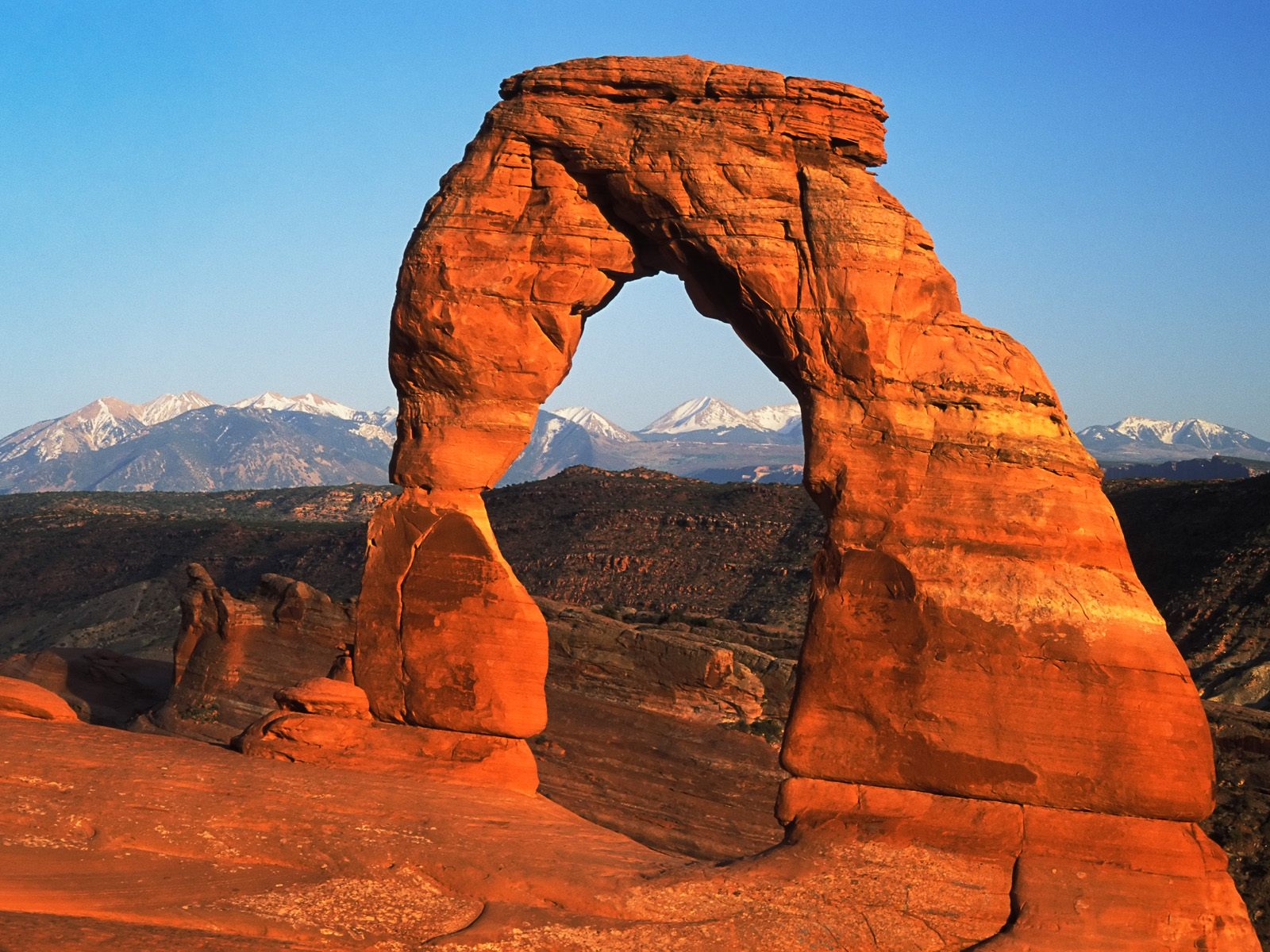



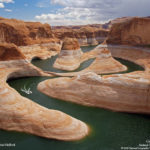
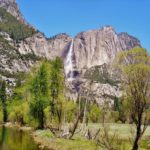

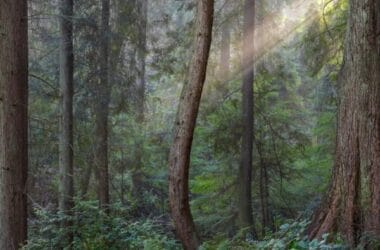
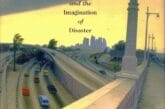
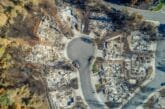



Pingback: Political Science vs. Science Science - By Peter Nichols | WilderUtopia.com
Pingback: Colorado River: Dams and Drought, the Folly of Taming Nature | WilderUtopia.com
I loved this article, which I read in doing research paper on Abbey’s masterpiece, Desert Solitiare. To help cite this excellent source, I’d appreciate it if I could get the name of this article’s author.
Thanks, William. I compiled and edited the series of quotes from Abbey himself and Robert Macfarlane. I appreciate you checking in! – Jack Eidt
Pingback: DamNation: On Dam Removal, Salmon and Wild Flowing Rivers | WilderUtopia.com
Pingback: 1988 Film 'The Bear' On The Perils Of Wilderness | WilderUtopia.com
Pingback: Mass Species Extinction and Wilding Wilderness | WilderUtopia.com